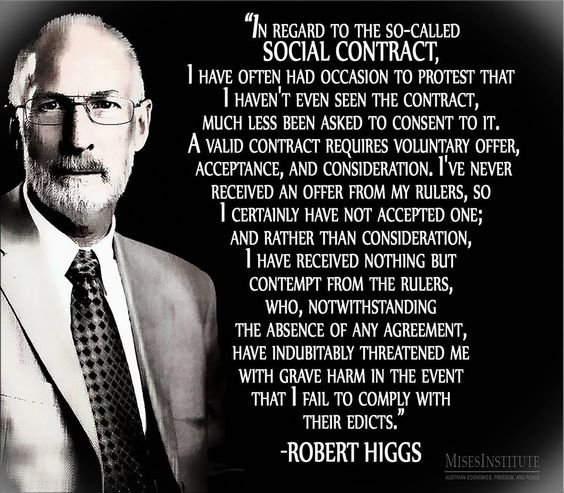One of the most perverse and pervasive errors in modern thought is the social contract theory. In short, it asserts that participation in society is tacit assent—if not outright consent—to a contract that requires submission to the government in the area. It was developed by philosophers who needed a workaround to avoid the necessary anti-government implications of their political thought, but it fails to hold any weight when examined closely. The root is confusion over consent, compliance, and coercion.
A contract is an agreement consisting of an offer, acceptance, an exchange of consideration, and voluntary consent. It may seem spurious to request evidence of a written and signed contract, but if a contract exists, there must be some kind of evidence beyond, "Well, you're here, so you consent."

Image credit: link
Quote source: "Consent of the Governed," by Robert Higgs
As an analogy, consider the difference between someone offering me a $20 bill and me demanding $20 from someone at gunpoint.
In the first instance, someone makes a voluntarily offer, I voluntarily accept it, and the $20 is exchanged. This may be a gift, a payment for some service I have rendered, or part of a trade. In any case, these are all examples of a voluntary exchange and a valid contract. There may be a written receipt for a transaction as evidence of the contract, but it need not be written down at all. Nonetheless, there is evidence of a valid contract in the nature of our actions.
In the second instance, I use the threat of force to compel someone against his will. The threat of force is ipso facto proof that there is no voluntary consent, and the other must choose to comply under duress or suffer harm should I carry out my threat. If someone were to frame this as some kind of voluntary exchange, they would need to show I had a higher claim to the bodily integrity and property of my victim. This is clearly an absurd usurpation on my part since it violates the universal and reciprocal nature of natural rights theory.
Compliance under duress is proof that consent was not given, and the social contract theory presumes that consent has somehow been granted. And yet, the proponents of the social contract theory claim that the latter is in fact a valid contract if enough other people agree and the proper rituals are performed. They even argue that the former example can violate the "social contract" if some third party disagrees with it.
For more, check out The Tom Woods Show, Episode 685: Taxation Isn’t Theft, Because of the Social Contract.
Mutual voluntary consent between individuals is the primary hallmark of human civilization. It is what allows the development of complex economies, technological advancement, and the massive interweaving web of relationships that constitutes society itself. It is our responsibility to pursue recognition of individual rights, understand the sphere of just individual authority, and seek consent if we are to ever achieve the potential of humanity.
Interesting, thanks for sharing. Followed and upvoted :)
I too was "under the spell" of the misdirection of the social contract theory. I attended a very pro-liberty/constitution liberal arts college and read the very words of Hobbes and Locke on the subject. Though we took a more Lockean perspective, we were still taught the brilliance of the malleable social compact theory of Locke and how it can be refashioned after a tyrant took place (who broke the old contract and reset the grounds to the State of Nature). However, what people forget is that a contract is only valid when voluntary; and the thought that all men and women are subject to arbitrary laws simply because their parents created these laws and put their children in subjection to them is illogical. The children, logically, should not be bound to these laws, unless the voluntarily agree to them. The laws must be agreed upon each generation -- and not collectively (because the justified uses of the SCT is simply a form of collectivism) but by each man and woman born into that society. Society is made of individuals, not a mass glob of a collective.
With that said, I think we should go back to Locke's state of nature: "The State of Nature, although a state wherein there is no civil authority or government to punish people for transgressions against laws, is not a state without morality. The State of Nature is pre-political, but it is not pre-moral. " (http://www.iep.utm.edu/soc-cont/#SH2b)
Basically, Locke's understanding of the State of Nature is the peaceful, voluntary anarchist society we yearn for today.
The (unspoken) social contract can only work if we assume everyone is a good person and then everyone acts accordingly. Unfortunately, we know this is not true and this is why we have government.
That doesn't make sense, because the "social contract" is what supports the idea of government in the first place in modern political philosophy. Democracy relies on the presumption that people are virtuous in the voting booth, but need a government to curb their perversity at all other times. There is no social contract, and government operates by coercion rather than consent. Politics creates the incentives for abuse and destruction.